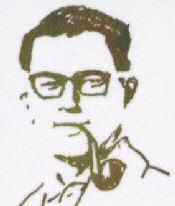Poet
Carlos Obregón

Carlos Obregón
(Colombia, 1929 - 1963)
Biography
Born in Bogotá, Carlos Obregón studied mathematical physics at the University of Michigan and returned to Colombia for a brief period during which he taught at the Universidad de los Andes. Subsequently he studied philosophy and became fascinated by theological matters and the mystics. He traveled widely in Europe, but lived mostly in Spain – where he published two books of poetry – mainly on the Balearic islands. He committed suicide at the age of 33, in Madrid.
At the same time that the most notable members of the ‘Mito’ group, Jorge Gaitán Durán and Eduardo Cote Lamus, published their first books, Carlos Obregón published his. He remains, however, a forgotten figure – perhaps the best-kept secret of Colombian poetry. Possibly this can be explained by his physical absence from the country from an early age onwards. Still an adolescent, he attempted to escape from his milieu and his family by traveling far and wide, first to the United States and then, after a brief stay in Colombia, to Europe. Dissatisfaction or, more precisely, impatience always accompanied his powerful personality; the kind of impatience which seems to be a common trait of suicides.
During his brief and intense life, Obregón published only two small books with a very personal tone, Distancia destruída (Distance Destroyed) and Estuario (Estuary), both published in Spain. In these, we can trail the tracks of his mystical concerns, his ontological questions and his longing to transcend. They closely reflect his own life, for he endured the hardship of the cloister, and suffered from recurrent religious crises, after a dissolute and expansive youth. One of those crises led to his suicide in Spain, the place he had chosen for his spiritual exile.
These two books, plus some unpublished poems – later included in his Collected Poems – amount to little more than two hundred pages. Yet Carlos Obregón is now beginning to be considered as one of the great Latin American poets of an elusive, one could say symbolist, movement. The following lines are emblematic of his work: “The contemplated night falls on his eyes/ with the patience of stars/ it searches its dwelling at the edge of the flesh/ and abandons in the soul its destiny/of a defeated sea between angels and abysses.” Together with kindred spirit Aurelio Arturo, Obregón has opened up a new direction of restraint and austere language in Colombian poetry.
© Juan Manuel Roca (Translated by Nicolás Suescún)
BibliographyDistancia destruída (Distance destroyed). Madrid 1957.
Estuario (Estuary). Palma de Mallorca, Spain 1961.
Obra poética (Collected Poems). Bogotá 1985.
Poems
Night guided him to a summit
Silence runs over all things
DESTROYED DISTANCE V
DESTROYED DISTANCE XII
Towards the future I go broadly speaking
Prayer of the bones
Passenger of the wind
On the hillock that falls as far as the rocks
Deeply resounds the solitude of the valley
At the time that the accursed die
Poems
Poems of Carlos Obregón
Sponsors
























